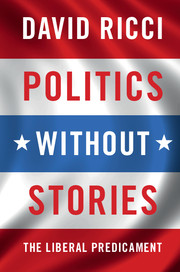8 - The List Syndrome
Published online by Cambridge University Press: 05 August 2016
Summary
I came to think that [President Jimmy] Carter believes fifty things, but no one thing. He holds explicit, thorough positions on every issue under the sun, but he has no large view of the relations between them … Carter thinks in lists, not arguments; as long as the items are there, their order does not matter, nor does the hierarchy among them.
James Fallows, “The Passionless Presidency” (1979)In sum, liberals don't tell inspiring stories to the public or themselves. More exactly, they don't tell the same inspiring stories that other liberals tell. Instead, says Kloppenberg, they approach their circumstances pragmatically. Consequently, as Shklar observes, they tend to fume when – in their view – social institutions and practices work poorly or not at all. We can see this in the books that they write. Yet since, to liberals, social failures occur frequently, it follows that people on the Left spend much of their time complaining about what should be fixed.
The result of the Left's constant complaining in one form or another is that liberal intellectuals, activists, and politicians tend to promote lists of proposals for new or improved government programs and policies. This is the reason for James Fallows's comment above on Jimmy Carter, for whom he worked as a speechwriter. But before we explore what I call “the list syndrome” and some of its consequences, let us stipulate that if Kloppenberg and Shklar are on target, we should regard pragmatism, culminating in grumbling, as the default setting for liberalism. The syndrome is straightforward: modern life isn't easy; let's check out the facts; in many cases, they testify to urgent problems; here's what we must do to relieve or solve those; if nothing is done, terrible consequences will follow.
Although neither Kloppenberg nor Shklar say so, to the extent that liberals are at heart pragmatists rather than raconteurs, they are politically vulnerable during modern campaigning. This point underlies our original concern. Alpha stories, which liberals lack, do not guarantee electoral success. But when voters seek assurance and meaning – say, via the categorical heuristic of supporting candidates who promote familiar expectations and aspirations – stories that weave together those sentiments may help to produce both.
- Type
- Chapter
- Information
- Politics without StoriesThe Liberal Predicament, pp. 132 - 154Publisher: Cambridge University PressPrint publication year: 2016



